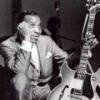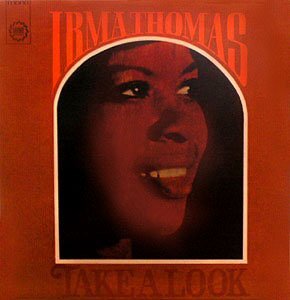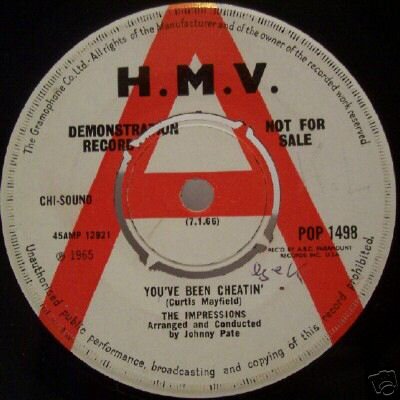Found by my mum (thanks mum!) and written by me in about 1988/89, this was supposed to be published in some music magazine but was rejected as the editor thought there wasn't any interest in Northern for the 'reading public'. This wasn't the supposed to be the finished article by the way - that would have been far more in-depth - and any mis-assumptions and errors are entirely my fault!
Northern Soul journey. How obscure Black American dance records from the 60s have fuelled the UK's most underground music scene for the last 20 years.
The Twisted Wheel
1963-1971.
A Manchester music club that is the one place most closely associated with the birth of what is now known as ‘Northern Soul’. Originally located in Brasenose Street, it later moved to Whitworth Street and in both cases exemplified the ‘soul/R&B club’ ethos that began in the early 1960s and is still with us today in most cities across the UK. The Brasenose Street venue’s music policy was dictated by Roger Eagle, now better known for his ‘New Wave’ club Eric’s in Liverpool, but at the time of the Wheel he was a pure blues and R&B enthusiast who played a wide selection of material to the then mostly Mod audience, records which wouldn’t today be accepted in any Northern venue as they would be regarded as too slow or in the case of some R&B, too close to Rock and Roll in sound. The later Whitworth Street venue by all accounts had a more up-tempo music policy fired by the urban sound of Motown and similar labels which apparently Eagle disliked, but it was very popular with audiences and carried the Twisted Wheel right through to the early 70s when the venue finally closed, but not before handing on the torch to, er, The Torch.
Typical soul records played, almost all UK releases:
Good Time Tonight - Soul Sisters
The Fife Piper - The Dynatones
Karate Boogaloo - Jerry O
Gonna Fix You Good - Little Anthony & The Imperials
A 'Lil' Lovin' Sometimes - Alexander Patton
Dr Love - Bobby Sheen
Open The Door To Your Heart - Darrell Banks
The Golden Torch
1965-1973
Although open as a music venue at the same time as the Twisted Wheel, it wasn’t until 1972 that the Torch, located in Tunstall near Stoke on Trent, became a major factor in the rise of Northern Soul in the UK. Arguably, it was musically the most important venue as it seems to have been the first place to put an emphasis on rare imported US singles rather than the UK released material, which in theory at least, anyone could have bought from their local record shop in the 1960s. It also played music all night, which of course has led to the term ‘all-nighters’ to refer to such events which has the been the norm for Northern events ever since. The fact that a venue was playing such ground-breaking music and was open all night attracted a large amount of interest from soul fans and sadly, the police also. The fact that dancers usually took amphetamine to keep going all night and that the Torch was often crowded beyond capacity meant that the local authority simply refused to reissue a licence for the club in 1973, by which time a certain venue in Wigan was all ready to take over the lead.
Typical records played:
Sliced Tomatoes - Just Brothers
Crackin' Up Over You — Roy Hamilton
Thumb A Ride — Earl Wright
I'm Standing — Rufus Lumley
Soul Self Satisfaction — Earl Jackson
Keep On Keepin' On — NF Porter
Love You Baby — Eddie Parker
Earthquake — Bobbi Lynn
Wigan Casino
1973-1981
The most famous of all Northern Soul venues is without doubt, Wigan Casino. The first all-nighter was in September 1973, and although by all accounts it wasn’t exactly a sell-out, the club continued and soon was the heart of what was by now a rapidly expanding scene. Wigan wasn’t just a venue for dancing and music, it also codified what most people today regard as Northern Soul in terms of dress (extremely baggy trousers and vests for the boys and long loose skirts and t-shirts for the girls), lifestyle (staying up dancing all weekend), slang (‘keep the faith’ ‘right on now’) and drugs (again amphetamines). The larger size of the Casino also meant that there could be separate rooms for oldies (well-known records) as well as the larger main hall where little-heard and/or unknown music could be played. Wigan soon became the focus for Northern Soul for youngsters all over the UK and it was not unknown for people to attend from any and every part of the country and even abroad. Musically, Wigan is best known today for three things: the famous ‘Three Before 8’ played at the end of every all-nighter and, unfortunately, rubbish pop acts such as ‘Wigan’s Ovation’ and the tendency for some DJs to play records which were almost totally lacking in any soul but which had the right beat. Hence even today, records such as ‘Joe 90 Theme’ and ‘Hawaii 5-0’ are often considered by people as typical Northern records despite the fact that Wigan actually played numerous superb genuine soul records during its lifetime, which ended with the Casino’s closure in 1981.
Typical records played:
Three Before 8: these were played in order at the end of each all-nighter.
Time Will Pass You By - Tobi Legend/Long After Tonight Is Over - Jimmy Radcliffe/I'm On My Way - Dean Parrish
Others:
Skiing In The Snow — The Invitations
Tainted Love — Gloria Jones
Stick By Me Baby — Salvadors
Country Girl — Vickie Baines
What — Judy Street
The Joker — The Milestones
I’ll Always Need You — Dean Courtney
The Blackpool Mecca
1971-1979
Ask most people what defines a Northern record and the answer will probably be something like ‘60s US soul’, which in most cases is true. However, what happened at the Highland Room in the Blackpool Mecca added a new strand to Northern — the ‘modern’ 70s soul sound. The Mecca began nights playing Northern in 1971, and initially followed the traditional path of playing rare and up-tempo 60s soul in keeping with other clubs around at the time. It wasn’t an all-nighter venue and many people would attend the Mecca until 2am and then go on the places like Wigan to get their full fix of music and dancing. What happened at Blackpool was that in 1974 or thereabouts, newly released records which seemed to fit into the Northern ethos began to get played, particularly The Carstairs ‘It Really Hurts Me Girl’ and others. Fans of this new music soon began asking for the newer records at other venues and soon even Wigan — generally a bastion of up-tempo 60s ‘stompers’ — soon began playing some modern stuff. Northern Souls fans are, after all, soul fans first and foremost and it wasn’t hard to begin liking modern sounds provided they were good dance records and had soulful vocals to suit. Even today, most events play a mixture of 60s and 70s music and most people accept ‘modern soul’ as much a part of the scene as the classic 60s sound.
Typical records played:
60s sounds:
Landslide - Tony Clarke
If That's What You Wanted - Frankie Beverly & the Butlers
R. Dean Taylor - There's A Ghost In My House
Modern sounds
It Really Hurts Me Girl - The Carstairs
Cashin' In - Voices of East Harlem
Clean Up The Ghetto - Philadelphia All Stars
Seven Day Lover - James Fountain
Northern Soul in the 80s.
Wigan closed in 1981 and, for many people, that was the end of Northern. A lot of people left the scene and it seemed as if it would be impossible to keep things going in any meaningful way. A few people begged to differ of course and looked for new ways to keep things relevant and interesting. All-nighters continued at venues such as Cleethorpes Pier, The 100 Club in London and Clifton Hall in Rotherham, but the scene had suffered an almighty blow and it looked like it might just peter out with a range of oldies nights catering for fans but playing the same stuff that had been heard for the last 15 years. Surprisingly, new blood came into Northern from an unexpected source — the Mod revival. Kids usually got into Mod through Quadrophenia or The Jam, which had nothing to do with soul music, but soon, some of them started getting away from that side of things and found Northern much more to their tastes, and of course, it was historically correct for Mods to be soul fans anyway, so it all fitted in along the way. Long standing punters were, it seems, unimpressed with legions of youngsters in parkas coming into their scene but once the Mods learned the ropes, it settled down and soon Northern Soul had a young and enthusiastic group of people injected into it which was all for the good. By the mid 80s, three very important venues had been established: Morecambe Pier, which was a good old traditional stompers venue renowned for its atmosphere and driving beats; the 100 Club as mentioned above which played a wide range of superb soul and even R&B music and also continued the ‘cellar soul club’ tradition as well as being the home to the Kent/Modern series of LPs, which opened a lot of people’s ears to what rare soul had to offer and finally, and for me most importantly, The Top of The World all-nighter at Stafford. The reason why Stafford was so important was that it had a policy of (generally) playing unknown and unusual sounds. Initially, through DJs such as Gary Rushbrooke and Pat Brady and later through the dynamic duo of Keb Darge and Guy Hennigan, people were exposed to a whole range of new and exciting music. Anything was possible at Stafford — well, within reason — and soon it even developed its own tradename — ‘60s Newies’, meaning records that were new to the scene and had been overlooked before or were even totally unknown to previous DJs and dancers. Latin-tinged sounds became popular, R&B was resurrected and mid-temp or (gasp!) even slow records became not just acceptable but were often the most popular and in-demand records around. The whole scene was changed by Stafford, which wasn’t to everyone’s taste of course, but Northern Soul had shown that it was capable of changing and continuing on into the present day not by losing the rare soul ethos but by retaining it and making it appealing to both old and new fans of the music. Long may it continue as the UK’s most eclectic and underground scene.
Want to find out more?
Anyone wanting to take the first step into the Northern scene should first pay a visit to your local record shop. There are several compilation LPs available which will give you an intro into the music in its many varied forms, such as the afore-mentioned Kent/Modern series, but also others such as the ‘Out On The Floor’ LP issued by Inferno or the other releases such as those on Charly Records. It’s also worthwhile looking in the second hand racks as there were several compilations issued in the 70s and even 60s which are worth searching out, although avoid ‘Casino Classics’ at all costs unless you are interested in the worst of what was played there! Finding 45s in high street shops is pretty much impossible although you might get lucky and there are reissues available from the likes of Inferno, but to be honest most singles are only to be found at Northern night themselves — speaking of which….
Today there are numerous Northern, rare soul, rhythm and soul, 60s soul and similar events going on in cities and towns all over the UK. Finding them can be a problem however. Most don’t advertise widely except to those in the know and most aren’t interested in attracting normal people inside! If you want to find something going on, the first thing is to look for a copy of ‘Black Echoes’ or ‘Echoes’ newspaper, which has a small Northern section at the back listing most events going on. Failing that, look for any posters or flyers which might advertise an event locally. Finally, (and this might not be the safest way to do it) look out for anyone fitting into the description of Mod, scooterist or soul fan. Asking them directly might be the best way to find out what’s happening in your area and who knows, you might find yourself getting involved in a whole new way of life and more importantly will lead you to some of the best dance music you’re ever going to hear — trust me on that one!




